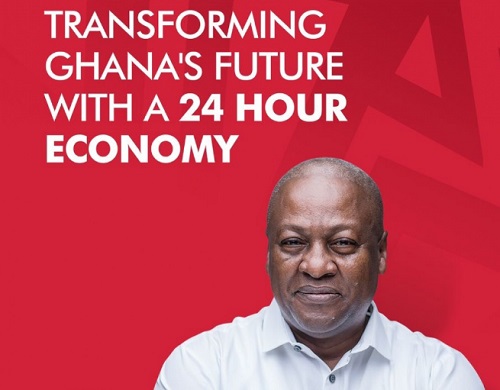Adopting a 24-hour economy project to promote productivity and economic growth is undoubtedly a remarkable intervention. Businesses and employees may benefit from flexibility, but it also necessitates careful planning and evaluation of its effects.
John Dramani Mahama has stated that his proposed 24-hour economy proposal is the answer to Ghana’s economic and financial problems.
The former president emphasized that this endeavor is essential for resolving the nation’s current and future issues. He said this during a special live broadcast titled “Mahama Conversations.”
“It will create an enabling environment with deliberate policies for businesses, companies, and government institutions to operate 24/7 in a three-eight-hour shift system.”
This policy covered the following 12 sectors: business registration and permits; land title registration; driver and vehicle licensing; tax and revenue services; utilities connections; birth and death registration; social welfare services; police and security services; courts and legal services; passport and immigration services; customs and port services.
Public and Private Sector Cooperation:
The policy will incorporate both public and private sector backing. The goal of this partnership is to develop a complete framework of rules and regulations that guarantee the rights and protections of workers while also supporting 24-hour company operations.
Incentives for Businesses: Companies that use the 24-hour operation model can take advantage of several incentives, such as financing support for manufacturing and agro-processing industries, smart metering for less expensive electricity during off-peak hours, and favorable tax laws.
Investment in Technology and Infrastructure:
The policy calls for large expenditures in public facilities, transit networks, and security systems, among other infrastructure projects. To enable smooth operations and automation, improving digital infrastructure will also be emphasized.
Creating Jobs and Employment:
Longer operating hours mean more manpower. This will result in many job opportunities across multiple sectors.
Economic Growth and Competitiveness:
Ghana hopes to become more competitive internationally by boosting output and productivity. The 24-hour economy will increase Ghana’s export potential, draw in foreign investment, and support local companies.
Safety and Security:
Regulations about private security will guarantee the safety and security of establishments.
The overall goal of Ghana’s 24-hour economy policy is to modernize the country’s economy, lower unemployment, and promote sustainable economic growth by establishing an atmosphere that encourages 24-hour company operations.
BY: APPIANIMAA MERCY





